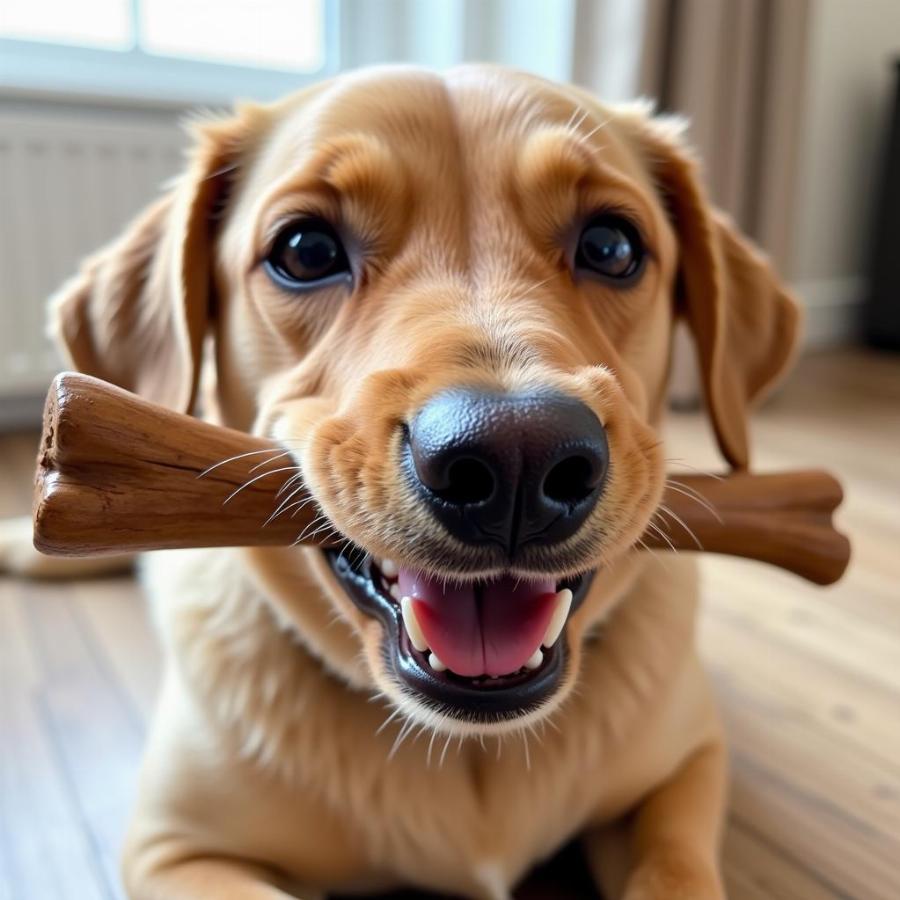Choosing the right bones for your dog can be a tricky task. While dogs love to chew, not all bones are created equal. Some can pose serious health risks, while others offer excellent benefits for dental health and mental stimulation. This comprehensive guide will help you navigate the world of bones good for dogs to chew, ensuring your furry friend enjoys a safe and satisfying chewing experience.
Understanding Your Dog’s Chewing Needs
Why do dogs chew in the first place? Chewing is a natural instinct for dogs, fulfilling several important needs. For puppies, chewing helps relieve teething pain. For adult dogs, it’s a great way to relieve stress, boredom, and anxiety. Chewing also provides mental stimulation and helps keep their teeth clean. Understanding these needs will help you choose the right bones good for dogs to chew.
Safe Bones for Dogs: Making the Right Choices
Not all bones are safe for your dog. Cooked bones, especially poultry bones, are extremely dangerous as they can splinter and cause internal injuries. So, what bones are good for dogs to chew? Here are some safe and healthy options:
- Recreational Bones: These are large, hard bones meant for gnawing, not consuming. Examples include beef knuckle bones, marrow bones, and hip bones. Supervise your dog while they chew on these and discard them when they become small enough to swallow.
- Edible Bones: These are softer, more digestible bones that dogs can fully consume. Examples include raw chicken necks and wings (never cooked!), and beef ribs. These should be sourced from reputable butchers and fed raw. Always supervise your dog when giving them edible bones.
 Dog Chewing a Bone
Dog Chewing a Bone
Are Elk Antlers Good for Dogs?
Elk antlers are a popular chew option for dogs, offering long-lasting chewing enjoyment and promoting dental health. are elk antlers good for dogs provide a natural source of minerals and can help scrape away plaque and tartar. However, they can be very hard and may not be suitable for all dogs, especially senior dogs or those with weakened teeth.
What are the Benefits of Elk Antlers for Dogs?
- Long-lasting and durable
- Natural source of minerals
- Promotes dental health
Are There Any Risks Associated with Elk Antlers?
- Potential for tooth fractures in dogs with weakened teeth
- Not suitable for all dogs
Alternatives to Bones: Expanding Your Options
If you’re hesitant about giving your dog bones, there are plenty of safe and healthy alternatives. great healthy chew for small dogs are readily available. These include:
- Bully sticks: These are made from dried beef pizzle and are a highly digestible and long-lasting chew.
- Dental chews: Specifically designed to promote dental health, these chews come in a variety of shapes and sizes.
- Rawhide alternatives: Look for rawhide alternatives made from natural ingredients like sweet potato or rice flour.
Is it OK for Dogs to Chew on Sticks?
While fetching sticks seems like a fun and natural activity, it’s generally not recommended to let your dog chew on them. is it ok for dogs to chew on sticks can splinter and cause injuries to your dog’s mouth, throat, and digestive system.
Himalayan Chews for Dogs: A Natural and Long-Lasting Option
Himalayan chews, made from hardened yak and cow milk, are another excellent option for dogs who love to chew. himalayan chews for dogs are long-lasting, digestible, and rich in nutrients. They also help clean teeth and satisfy a dog’s natural chewing instincts.
Good Toys for Teething Dogs: Soothing Sore Gums
If you have a teething puppy, providing appropriate chew toys is essential. good toys for teething dogs can help soothe their sore gums and prevent them from chewing on inappropriate items. Look for toys made from durable rubber or nylon that are specifically designed for teething puppies.
Conclusion: Choosing the Best Bones for Your Dog
Providing your dog with safe and appropriate bones to chew is crucial for their physical and mental well-being. By understanding their chewing needs and choosing the right types of bones and alternatives, you can help keep your furry friend happy, healthy, and entertained. Remember to always supervise your dog while they are chewing and discard any bones that become small enough to swallow.
FAQ
- Can I give my dog cooked bones? No, cooked bones are extremely dangerous and should never be given to dogs.
- What are the best bones for puppies? Soft, edible bones or specifically designed teething toys are best for puppies.
- How long should I let my dog chew on a recreational bone? Supervise your dog and take the bone away when it becomes small enough to swallow.
- What are some good alternatives to bones? Bully sticks, dental chews, and rawhide alternatives are great options.
- Are rawhide chews safe for dogs? Look for rawhide alternatives made from natural ingredients, as traditional rawhide can pose some health risks.
- What should I do if my dog swallows a bone? Contact your veterinarian immediately.
- How can I tell if a bone is too hard for my dog? If your dog struggles to make an indent in the bone with their teeth, it’s likely too hard.
Beaut Dogs is your ultimate resource for all things dog-related, offering expert advice and information on dog breeds, care, training, and much more. Visit us at Beaut Dogs. For personalized assistance, contact us at [email protected] (Email address). We’re here to help you provide the best possible care for your canine companion.